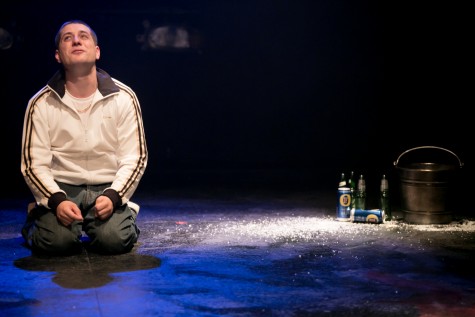
Photo credit Farrow Creative
Welsh playwright Gary Owen wrote this shattering triptych of vulnerable masculinity in 2001. Now, in 2014, it gnaws at the bone just as much. In fact, in this production by Waking Exploits, it may as well snap the bone off completely. Three accomplished actors deliver three similarly brash, shocking monologues in a strange hinterland spattered with empty bottles, shards of glass and a disused karaoke machine – a set designed aptly by Alison Neighbour that subtly reflects the shattered hopes of the characters.
First up is the eponymous Crazy Gary, equipped only with a tracksuit, a swagger and a murderous look in his eye. Gary – who is in no way based on the playwright (as far as I know) – makes sure we know he’s getting laid tonight. After carving an esteemed reputation at school as the bully, Gary now runs a mobile disco at the local pub. And no one gets in the way of his disco night. That’s common knowledge. But, of course, when it comes to the girl of his dreams, we find he’s capable of some ounce of compassion, although violence seems to be his only way of coping. Jordan Bernarde embodies the role brilliantly, conveying the character’s psychopathic hostility as well as his brittle spirit.
Gwydion Rhys then steps up to the mic and warbles us a ballad as Matthew D. Melody, the next in the troubled trio. Karaoke King Matthew, bearing a perturbed stare and a wailing singing voice, tells us of his newfound love Candy, his devotion to God and his unfortunate incident involving the mutilated corpse of a cat.
Finally, Sion Pritchard gives the last and most twisted of the monologues – the one that finally ties the three into a firm and unbreakable knot. Pritchard plays Russell who is desperate to flee the town that has tormented him so. His attention-seeking girlfriend, however, has other ideas and blackmails him into following her rules. Still haunted by a horrific incident from his schooldays – something that links the three men – it seems Russell does not have much choice.
All the characters seem ruled by the women in their lives. Gary’s violent manner is made to seem pathetic when his dream girl snubs him. The girl of Matthew’s affection seems detached and aloof from his desire. Russell too is forced and threatened by his clearly unhinged partner, piling on more guilt on top of what already burdens him. Does this make the play misogynistic? Or rather, is it a feminist text? Since the women clearly have the upper hand here.
Under Matt Ball’s direction, the actors participate in each other’s monologues, voicing minor characters, thus amplifying the connection we eventually discover between them. Although each character has done best to avoid each other for years, something of their spirit lingers. The projected motifs of tearful eyes and bloodied teeth either side of the stage thicken once again the knot that binds them.
It’s not one for the faint-hearted, the narrow-minded nor the easily offended, but it is one for those hard knocks out there who relish Welsh drama. As a play, it adds emotional depth to the stereotype. It’s violent, yes. It’s crass, undoubtedly. But the cruelty is only a front for something tender and helpless. Here is masculinity crying for its mother.
Get The Chance has a firm but friendly comments policy.
